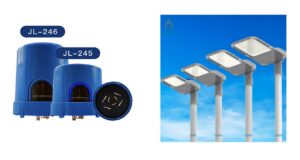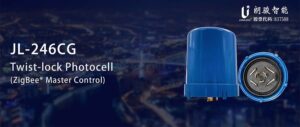Unlocking High-Performance Bluetooth Lighting Control: JL-722B2A2 + Casambi Gateway Explained
Introduce
Outdoor lighting keeps improving. So the need for smarter, wireless, more flexible control systems is at its peak today. One standout innovation is Long-Join’s JL-722B2A2, a Bluetooth-based smart photocell controller designed to simplify and modernize lighting automation.
This article breaks down how the JL-722B2A2 works, when to use a Casambi Gateway, and how both systems come together to power intelligent lighting infrastructures — from local campuses to large-scale smart cities.
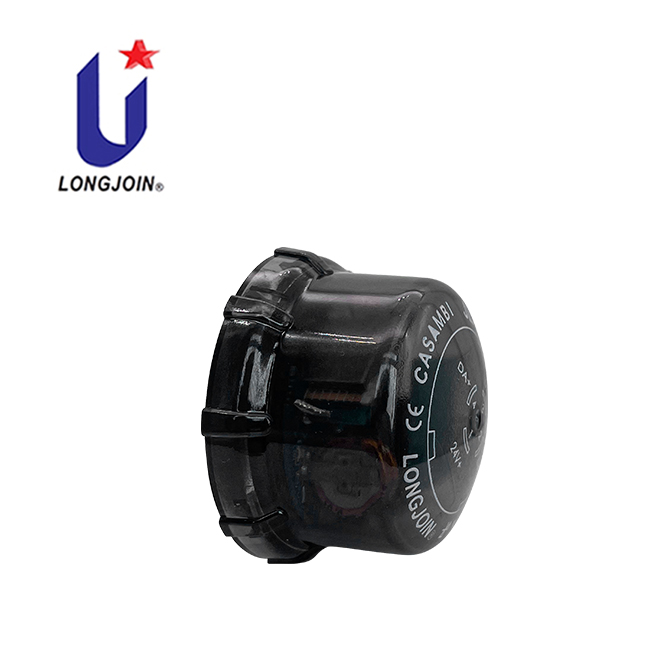
What Is the JL-722B2A2 Smart Photocell Controller?
The JL-722B2A2 is an advanced Bluetooth-enabled photocell sensor designed to automate outdoor lighting without heavy infrastructure. Unlike traditional controllers that rely solely on wired connections, this unit communicates wirelessly using the Casambi Mesh BLE protocol.
In simple terms, it’s a compact device that tells lights when to turn on, dim, or switch off — all through Bluetooth control. It supports Zhaga Book 18 standards, ensuring compatibility with most smart street light fixtures and modern LED luminaire systems.
Key Technical Advantages
Feature | Description |
Wireless Control | Operates via Casambi BLE network without complex wiring. |
Zhaga Socket Ready | Fully compliant with Zhaga Book 18 for modular fixture design. |
Global Certifications | UL / CE / RoHS approved for international markets. |
Built-in Surge Protection | Protects from lightning and voltage fluctuations. |
Dusk-to-Dawn Sensing | Integrated light photocell sensor enables precise day/night detection. |
These features make the JL-722B2A2 not just a lighting control device, but a scalable solution adaptable to multiple use cases — from small gardens to industrial campuses.
For detailed product specifications, visit Long-Join’s official JL-722B2A2 page.
How Does the Bluetooth Photocell System Work?
The concept behind this system is surprisingly simple. Each photocell sensor detects ambient light and sends data through Bluetooth Mesh to other devices in the network.
When configured via the Casambi mobile app, users can define automation rules — for instance:
- Turn lights on at sunset (based on local lux levels).
- Dim to 50% after midnight.
- Switch off automatically at dawn.
This eliminates the need for traditional wiring-based controls. The photoelectric sensor within the JL-722B2A2 measures real-time brightness, making adjustments dynamically.
Advantages Over Conventional Systems
Aspect | Traditional Control | JL-722B2A2 Bluetooth Control |
Setup | Requires physical cabling | Wireless, app-based setup |
Maintenance | Manual updates | Firmware updates via Casambi cloud |
Scalability | Limited | Easily expandable network |
Energy Monitoring | External meter required | Integrated in Casambi platform |
The result is smarter, faster, and greener lighting control. It sharply cuts installation time and significantly lowers long-term maintenance costs.
Do You Need a Casambi Gateway to Use JL-722B2A2?
The short answer: not necessarily.
For smaller or localized lighting projects, the Casambi mobile app alone is sufficient. It acts as the command center — pairing, controlling, and automating lights within a 10–20 meter radius.
Your smartphone becomes the remote control. You can rename devices, set lighting scenes, or adjust brightness levels instantly. This makes the JL-722B2A2 perfect for use in:
- Gardens and parks
- Residential compounds
- Campus walkways
- Small commercial spaces
However, as systems scale, the need for a Casambi Gateway grows.
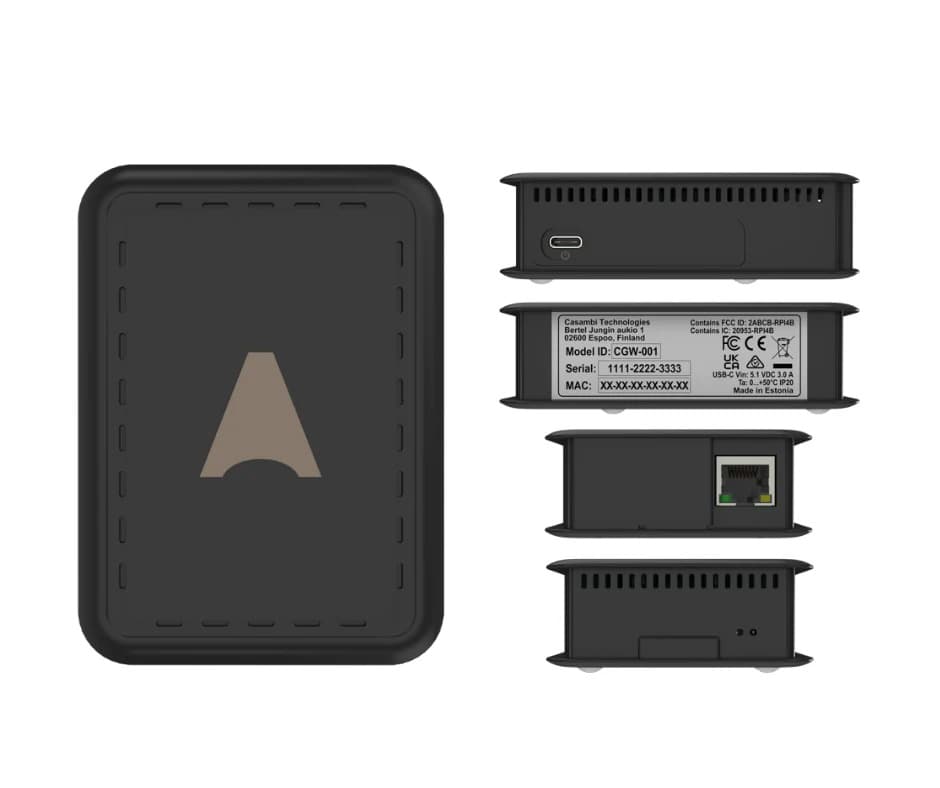
When Should You Add a Casambi Gateway?
Use a Casambi Gateway when you need remote access. It gives clear data insights. It also links many sites at once.
It links your Bluetooth lights to the Casambi cloud. Then you can monitor and control them from anywhere, anytime.
Typical Scenarios Requiring a Gateway
Application | Why a Gateway Helps |
Smart City Street Lights | Enables remote monitoring and fault reporting. |
Industrial Parks | Centralized energy dashboards and load balancing. |
Public Buildings / Campuses | Unified lighting management across departments. |
Municipal Projects | Firmware updates and schedule optimization. |
With the gateway, users can log into a cloud dashboard, view energy consumption reports, analyze dusk-to-dawn photocell performance, and even detect malfunctioning fixtures before they cause outages.
Tip: Long-Join’s JL-722B2A2 pairs seamlessly with both Casambi Basic and Cloud systems, making the transition between local and remote modes effortless.
For more insights into wireless smart control, explore Long-Join’s smart photocell control systems.
How Many Devices Can One App Control?
With the Casambi app, users can manage multiple controllers simultaneously within Bluetooth range.
The app supports creating groups and scenes, which is especially useful for coordinated control. For example:
- A “Night Mode” scene dims all park lights to 40%.
- A “Security Mode” turns on all pathways at full brightness.
This level of flexibility allows lighting designers and facility managers to configure entire networks without rewiring.
Control Efficiency Comparison
Parameter | Without Grouping | With Casambi Grouping |
Setup Time | Manual setup per light | Batch configuration |
Synchronization | Independent control | Synchronized scenes |
Efficiency | Moderate | Highly optimized |
This decentralized system means even if one device disconnects, others keep running. That’s one of the key advantages of Bluetooth Mesh architecture — fault tolerance and network resilience.
What Are the Main Use Cases of JL-722B2A2?
Different lighting environments demand different control methods. Below is a simple guide to help users match project types with control modes.
Project Type | Control Method | Casambi Gateway Needed? |
Residential / Garden | Casambi App (Local Bluetooth) | No |
Factory / Warehouse | Scene-based scheduling | Optional |
Government Street Lighting | Cloud control and remote diagnostics | Yes |
Smart City Networks | IoT and energy analytics | Strongly recommended |
For municipalities or contractors, the gateway-enabled option offers real-time reporting and fault alerts — crucial for ensuring safety and uptime.
Learn more about Long-Join’s industrial-grade photocell for street lights and how they integrate into smart systems.
What Problems Does JL-722B2A2 Solve for Lighting Engineers?
Lighting engineers often face recurring pain points:
- Limited communication range of legacy controllers
- High wiring costs for distributed lights
- Lack of interoperability between systems
- Delayed fault detection in large networks
JL-722B2A2 Bluetooth photocontrol covers all four. It offers wireless setup, precise photosensing, and auto dusk-to-dawn control. This makes deployment and maintenance simple.
It supports Zhaga socket standards. That makes parts fully interchangeable, so you can easily swap or upgrade without redesigning the whole luminaire.
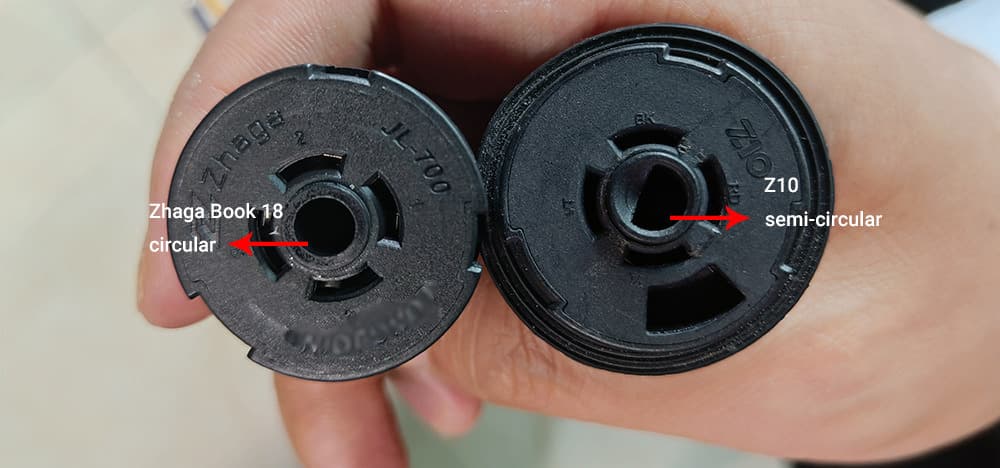
Why Is Zhaga Book 18 Compatibility Important?
Zhaga Book 18 defines the socket. It keeps the mechanical and electrical match steady between luminaires and control nodes like photocells.
Without a standard, makers ran into constant compatibility problems. Each fixture needed custom adapters or new housings.
The JL-722B2A2 eliminates that friction. Its Zhaga socket interface ensures plug-and-play installation with any compliant LED luminaire.
Benefit | Description |
Interchangeability | Works across multiple luminaire brands. |
Ease of Maintenance | Quick replacement without rewiring. |
Future-Proof Design | Ready for next-gen sensors and communication nodes. |
Zhaga-D4i ecosystem helps sustainability. Backed by groups like LightingEurope, it uses modular upgrades to cut e-waste and boost lifecycle efficiency.
This makes Long-Join a trusted partner for photocell and smart lighting makers. We stay committed to global interoperability.
How Does the JL-722B2A2 Enhance Energy Efficiency?
Energy consumption is one of the biggest concerns in outdoor lighting projects. The JL-722B2A2 uses light sensors and Bluetooth control. This boosts run time and cuts waste.
For example, it has a dusk-to-dawn sensor. It turns lights on when the area gets dim below a threshold.
A U.S. Department of Energy study found that adaptive lighting can cut city energy use by about 40–60%. Most of the savings come from dimming and simple, timed schedules across streets.
With the JL-722B2A2, users can access detailed energy dashboards (when connected via gateway), offering data-driven insights for sustainable design.
Why Choose Long-Join as Your Photocell Partner?
Long-Join has been a trusted manufacturer of photocell lighting sensors for over two decades. Their experience spans across UL773, CE, and Zhaga-compliant product lines.
What sets them apart is not only their manufacturing capacity but also their OEM/ODM customization options and technical support.
Capability | Description |
Experience | 20+ years specializing in photocontrols and lighting automation. |
Certifications | UL / CE / RoHS / Zhaga Book 18 compliant. |
Customization | Tailored OEM/ODM solutions for global brands. |
Support | On-site and remote technical configuration assistance. |
To explore their entire Bluetooth lighting control range, visit Long-Join’s product catalog.
How Can You Get Started with JL-722B2A2?
Whether you’re a lighting distributor, OEM manufacturer, or municipal engineer, the process is straightforward:
- Request the Technical Datasheet— Contact Long-Join for product specifications and electrical drawings.
- Download the Casambi App— Available for iOS and Android for instant pairing.
- Test a Demo Kit— Evaluate its dusk-to-dawn accuracy and network responsiveness.
- Integrate at Scale— Deploy across street lights, factories, or public installations.
For project consultations or partnerships, reach out via Long-Join’s contact page.
Conclusion
JL-722B2A2 is a Bluetooth smart photocell controller. It pushes outdoor lighting automation a step forward. It blends photoelectric sensing, Bluetooth Mesh, and Zhaga support. That gives unmatched flexibility to engineers and city planners.
From small campuses to big city networks, this solution links convenience and sustainability. It shows the future of lighting control is not just smart, but truly connected.
External Links:
●https://www.bluetooth.com/learn-about-bluetooth/feature-enhancements/mesh/
●https://play.google.com/store/apps/details?id=casambi.ambi&hl=en
●https://www.dali-alliance.org/zhaga-d4i/
●https://www.sciencedirect.com/science/article/pii/S2352484723014622

